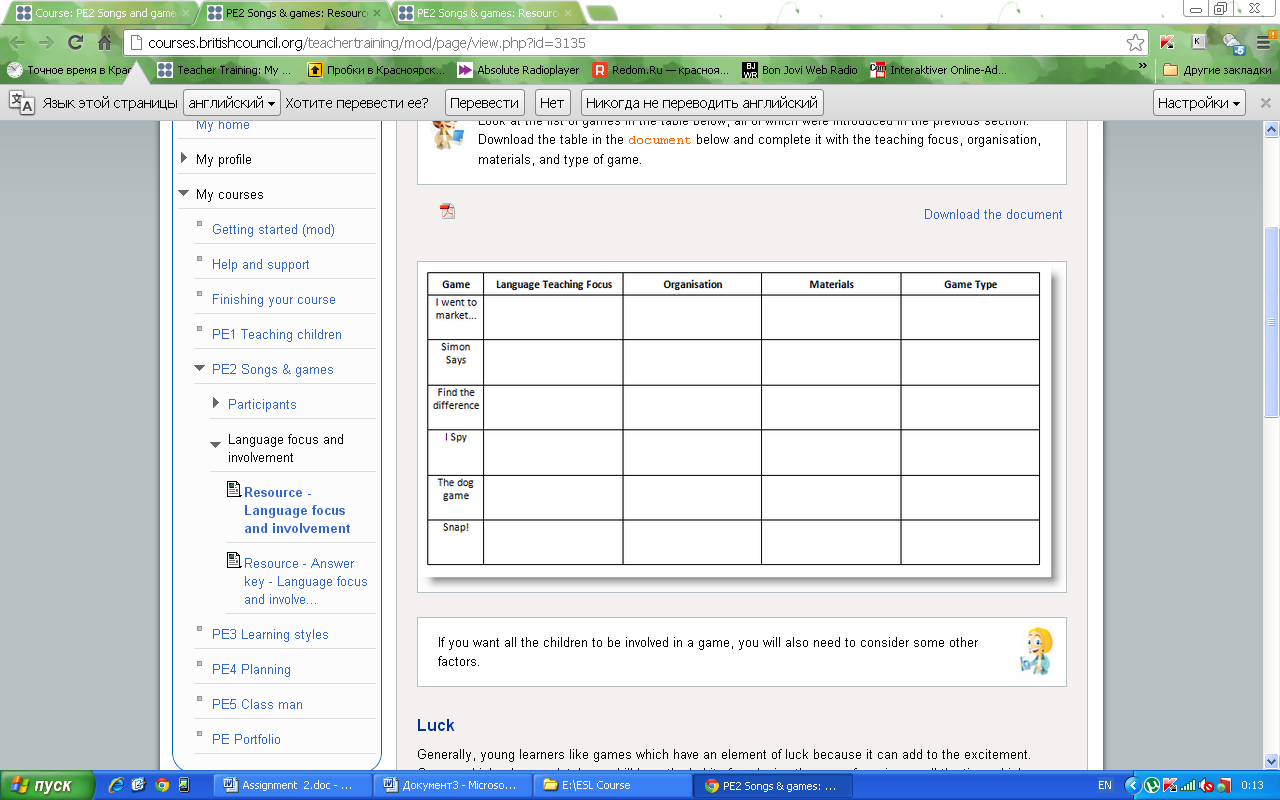
- •Songs and games
- •Learning outcomes
- •Why songs and games?
- •1.1 Why songs and games?
- •1.1 Why songs and games?
- •1.2 To sing or not to sing?
- •1.3 The advantages of songs and rhymes
- •1.3 Advantages of songs and rhymes
- •2.2 Action songs and rhymes
- •This is the way we ...
- •This is the way we say hello
- •2.3 Traditional versus contemporary songs
- •2.3 Traditional versus contemporary songs
- •Pizza and chips
- •3.2 Adapting songs for the language classroom
- •3.1 Commentary - Adapting songs for the language classroom
- •Actions
- •Adding sound effects
- •Substituting other tunes
- •Omission
- •3.2 Adding actions to songs
- •3.2 Commentary - Adding actions to songs
- •The Alphabet Song
- •Other song ideas
- •Final points about songs
- •4.1 Final points about songs
- •4.1 Final points about songs
- •Are the children involved?
- •Is language development integrated into the song?
- •Does it encourage active learning?
- •Games - what and why?
- •5.1 Games - what are they?
- •5.1 Games - what are they?
- •5.2 Why games?
- •5.2 Why games?
- •Purpose, organisation and materials
- •6.1 Purpose, organisation and materials
- •The purpose of playing games
- •Code-control games
- •Communication games
- •Patterns of organisation
- •Materials and equipment needed
- •The Word Chain game
- •Language focus and involvement
- •7.1 Language focus and involvement
- •Competition and Co-operation
- •Uncertainty
- •7.1 Answer key - Language focus and involvement
- •Songs, rhymes and games - things to avoid
- •8.1 Songs, rhymes and games - things to avoid
- •8.1 Songs, rhymes and games - things to avoid
The Word Chain game
Card games
In "Snap" you need cards with single words or pictures written on them. There should be four or five cards with the same word/picture and a total of 50/60 cards per group of four/six. The cards are dealt out randomly to all the players in the group.
They are dealt face down and the players hold them face down. In turn, each player turns a card and places it in front of him/her to form his/her own pile. When the cards at the top of the two piles are the same, any member of the group can call "Snap!" The first player to do so collects in those two piles. The winner is the player who collects all the cards.
Materials-free games
"I Spy" is a game which relies on talk and listening and does not need any materials.
The first player stands at the front, silently chooses a visible object in the classroom, and says, "I spy with my little eye something beginning with _____ (initial letter)".
The other children in the class raise their hands to offer suggestions (the player at the front of the class selects one at a time), e.g. "Is it a ...? Yes, it is./No, it isn't a ...". Whoever guesses correctly changes places with the player at the front and declares, "I spy with my little eye ...", and the game goes on.
These are just a few of the types of games you can play with your young learners.
For further practical ideas refer to Vale, D. & Feunteun, A. (1995), Teaching Children English, Great Britain: Cambridge University Press, pp. 262-266.
Three other sources you might like to look at are:
Cant, A. & Superfine, W. (1997), Developing Resources for Primary, London: Richmond Publishing
Toth, M. (1995), Children's Games, Great Britain: Heinemann English Language Teaching
Paul, D. (1996), Songs and Games for Children, Great Britain: Heinemann English Language Teaching.
7
Language focus and involvement
This exercise will take around 20 - 30 minutes.
The important thing to look at when selecting a game is that the language is at a suitable level and which skills it practises.
Look at the list of games in the Language focus and involvement resource below and identify the language teaching focus of each game.
7.1 Language focus and involvement
Look at the list of games in the table below, all of which were introduced in the previous section. Download the table in the document below and complete it with the teaching focus, organisation, materials, and type of game.

If you want all the children to be involved in a game, you will also need to consider some other factors.
Luck
Generally, young learners like games which have an element of luck because it can add to the excitement. Games which rely completely on skill have the habit of producing the same few winners all the time which therefore quickly reduces the level of involvement of the majority of players.
Competition and Co-operation
Some games involve competition in order to play and others require co-operation. Some involve both. Although every game has an element of competition, players may need to co-operate with each other to compete against the challenge that the game sets up. 'Find the Difference' is one such example.
Co-operation involves and encourages verbal negotiation. As we have already mentioned, many games are simply competitive and winning is the main goal. Competition can sometimes be made less stressful for the children if they work in teams.
"With young learners, it is important for winning to come everyone's way at some point in order to maintain involvement and enthusiasm. Using teams and groups also helps to reduce the individual pressures of competition."
Brumfit, C., Moon, J. and Tongue, R. (1996) Teaching English to Children - from practice to principle. England: Longman p5
